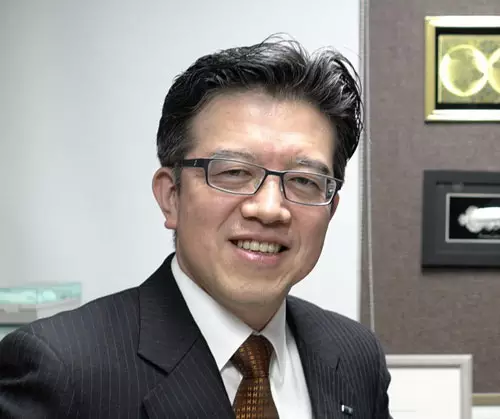编者按:2015年6月27日,在第十届全国胃癌学术会议的开幕式后的大会主题报告中,来自北京大学肿瘤医院的季加孚院长和沈琳教授、来自日本的Takeshi Sano教授和Toshikazu Ushijima教授、来自韩国的Sung Hoon Noh教授和Han Kuang Yang教授分别做了精彩学术报告。《肿瘤瞭望》采访了Han Kuang Yang教授和Takeshi Sano教授,并整理了Toshikazu Ushijima教授的报告内容,与读者分享:
外科手术在胃癌治疗中的地位
Role of Surgery in Gastric Cancer Treatment

——韩国首尔大学医院 Han Kwang Yang 教授访谈
Oncology Frontier: There are two different treatment strategies for resectable gastroesophageal junction cancer patients. The esophageal cancer with neoadjuvant chemoradiotherapy and subsequent esophageal resection or the stomach cancer by preoperative chemotherapy and gastrectomy for treatment. Studies have shown that neoadjuvant therapy, not surgical treatment types affects gastroesophageal junction cancer patients’ overall survival. How do you think of this problem?
《肿瘤瞭望》:对于可切除的胃食管结合部肿瘤患者有两种不同的治疗策略。按食管肿瘤采用新辅助化放疗和后续食管切除术,或者按胃肿瘤采用术前化疗和胃切除术进行治疗。有研究表明新辅助治疗而非手术治疗类型影响胃食管结合部肿瘤患者的总生存期,您是如何看待这个问题的?
Dr Yang: When we have a GE-junction tumor which is bulky and/or with a lot of lymph node involvement, it is likely that complete resection is not possible. In these circumstances we start t reatment wi th neoadjuvant chemotherapy. One important consideration with neoadjuvant chemotherapy is gauging response predictability. We know that around 5% of patients will progress in spite of chemotherapy. So when we have a bulky GE-junction tumor, we have a discussion involving the medical oncologist and radiologist as to whether it is better to operate or use chemotherapy first. These strategies are still experimental.
Dr Yang:当食管胃结合部肿瘤体积较大或者有较多淋巴结转移的时候,完全切除的可能性就不是很大。在这些情况下,我们会采用新辅助治疗。对于新辅助治疗的一个很重要的考虑要点就是评估治疗的反应。我们知道大概有5%的患者即使做化疗,疾病也会发生进展。所以当我们遇到体积很大的食管胃结合部肿瘤,我们会和肿瘤科和放疗科医生讨论这个患者是否适合手术还是先用化疗更好。但是这些治疗策略还在实验阶段。
Oncology Frontier: Surgery is the only way to cure the cancer of the stomach and the lymph node cleaning is the key to the stomach surgery. The range of lymph node removal is still controversial. Can you introduce the KLASS II research to us and describe briefly the difference between D1+ versus D2 lymph node cleaning?
《肿瘤瞭望》:外科手术是目前唯一能治愈胃癌的方法,胃周淋巴结清扫是胃外科手术中的重点,至今仍有争议的是淋巴结清除之范围。您能和我们介绍一下KLASS II的研究内容吗?简单地阐述一下D1+和D2淋巴清扫的区别在哪里吗?
Dr Yang: According to our study, GE-junction tumors particularly Siewert type II and III assessed as esophageal tumors versus gastric do not predict survival well. The survival curves cross and are not well separated. It is better to apply a gastric staging system which does separate them properly and at each stage, survival is the same for GE junction and gastric cancers. So biologically, GE junction types II and III are considered as gastric. We have ongoing studies in our laboratory looking into the challenging question of GE-junction tumors as independent cancers with a different biology. We are looking at genomic profile studies.
Dr Yang:在我们韩国,根据发表在JCO上的KLASS研究回顾性数据,我们得出的结论是腹腔镜和开腹手术没有显著性差异。我们期待在2018年以后,大部分胃癌手术都通过腹腔镜的技术完成。韩国多中心的ADDICT研究就关注D1和D2淋巴结清扫术。虽然这个研究还处于早期阶段,但是我们也会因为第11p和12站淋巴结的清扫导致并发症率增加而去改变我们的手术清扫方式。对于我们中的很多外科医生,腹腔镜手术可能并不很难,但是对于西方的外科医生,这个手术相对没那么简单。





 京公网安备 11010502033352号
京公网安备 11010502033352号